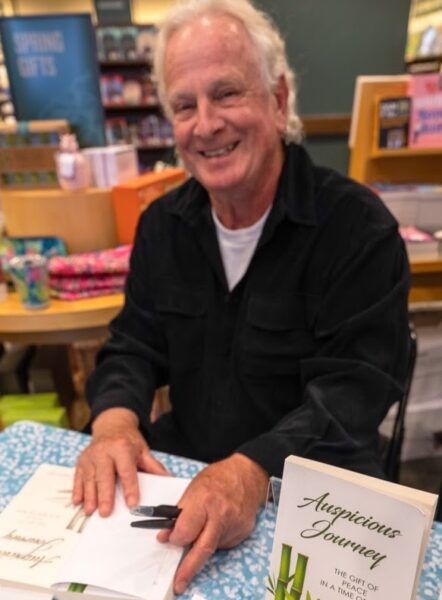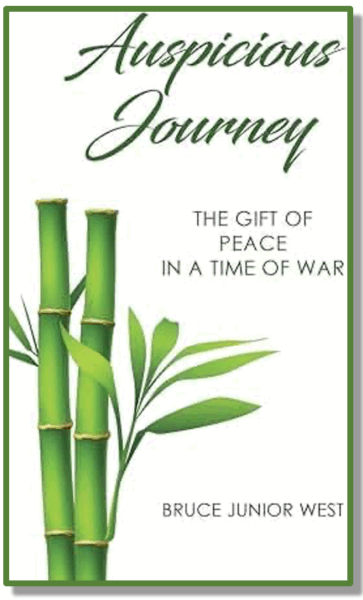As we honor the fallen on Memorial Day, West helps us better appreciate the sacrifice and the true cost of war.”
For someone my age, it’s difficult to believe that 50 years have passed since the fall of Saigon and the unofficial end of the Vietnam War. Of course, the only thing more difficult to believe, given the cost, human and otherwise, is that the U.S. actually got involved in that mess-of-a-bloodbath in the first place.
 Atascadero author Bruce Junior West fought the Vietnam War on two fronts. The first was his tour of duty in 1968 as a 23-year-old U.S. combat engineer in a small Vietnamese village, just a grenade’s throw from the port city of Da Nang.
Atascadero author Bruce Junior West fought the Vietnam War on two fronts. The first was his tour of duty in 1968 as a 23-year-old U.S. combat engineer in a small Vietnamese village, just a grenade’s throw from the port city of Da Nang.
The second began when West, mentally battered and bruised, returned home to a divided country and mixed personal emotions about his own experience. He soon found himself a stranger in a strange land, caught up in the domestic strife of the late ‘60s and discovering that, on many levels, Vietnam had come home with him.
West, a retired San Luis Obispo County probation officer, has written two compelling novels that bookend his military experience and post-war adjustment: Auspicious Journey: The Gift of Peace in a Time of War and Summer of Love: The Return.
Despite being a self-proclaimed history buff, I don’t read all that much in the military genre, especially not about Vietnam. I’m not a veteran. I recall the vivid TV images being beamed into my home on the evening news. Protesting was part of my college experience. I don’t need to read the book.
 But Auspicious Journey takes us on an entirely different, completely memorable, journey. West doesn’t focus on his fellow soldiers. His focus, his heart, lay with the innocents, the villagers caught up in the nightmare.
But Auspicious Journey takes us on an entirely different, completely memorable, journey. West doesn’t focus on his fellow soldiers. His focus, his heart, lay with the innocents, the villagers caught up in the nightmare.
“Dan” is the rookie newbie, assigned to the tiny village of Hoa An along with his partner Steve. The two men are part of the military’s Civic Action Program, the only Americans left behind after the area has been secured and the troops have moved on.
Soon Steve is gone, and Dan is left on his own to help the villagers navigate the fog of war, becoming the local troubleshooter for roads that need to be repaired or homes that need rebuilding.
West pulls no punches in documenting how the war consumes Hoa An, and many scenes involving young children and women are disturbing, often gut-wrenching. Dan quickly finds himself ashamed of some of his superiors, of the whole “attitude” coming from the men in uniform.
But what distinguishes Auspicious Journey from other Vietnam stories is the humanity that shines through, even in the darkest times.
 Central to Dan’s journey is his relationship with Ong De, the headmaster of the local school, who becomes the conscience of the story. At one point, after a particularly traumatic incident, Ong De consoles Dan, saying “Sometimes we must accept what is so that we can prepare for what’s next.”
Central to Dan’s journey is his relationship with Ong De, the headmaster of the local school, who becomes the conscience of the story. At one point, after a particularly traumatic incident, Ong De consoles Dan, saying “Sometimes we must accept what is so that we can prepare for what’s next.”
For West, the writer, what came next was Summer of Love, charting Dan’s return to California with all those horrific images from the war etched in his memory. The country is ablaze with protests and Dan has to wrestle with deep questions about the war and how to ease himself back into a society that really doesn’t want anything to do with a Vietnam veteran.
As with the first novel, West is unflinching in using his fictionalized self to reveal his struggle and those of many of his fellow veterans.
Friends of mine who have been to war—Tom Madsen, King Harris, Frank Sheahan—have never discussed their experiences with me. Reading these two books helps me understand why. It must have taken great strength and courage for West to relive all of these experiences and commit them to paper.
As we honor the fallen on Memorial Day, West helps us better appreciate the sacrifice and the true cost of war.
West will host a Q&A and book signing at 2 p.m. on Saturday, May 31, in the rear garden of the Sauer-Adams Adobe in San Luis Obispo. A second signing is scheduled for 10 a.m. on Sunday, June 8, at Country Touch Café in Atascadero.
